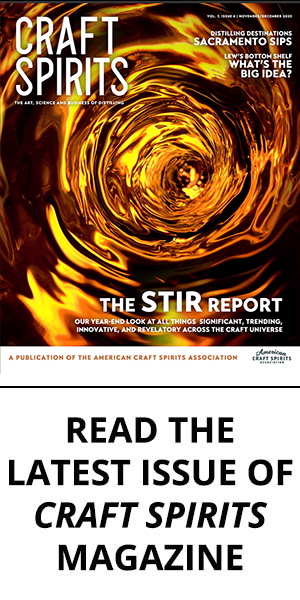
On Wednesday, ACSA unveiled assets for a direct to consumer (DtC) shipping campaign during a roundtable for state distilling guilds via Zoom. ACSA’s state guilds committee co-chairs P.T. Wood (Wood’s High Mountain Distillery in Salida, Colorado) and Gina Holman (J. Carver Distillery in Waconia, Minnesota) welcomed distillers from across the nation to hear updates on DtC and upcoming legislation to benefit distilleries.
Dan Farber—ACSA board member, chair of ACSA’s DtC committee and founder and distiller of Osocalis Distillery in Soquel, California—provided an update on ACSA’s efforts to pave the way for DtC shipping. Our goal is to modernize state laws and regulations to achieve parity with wine (which can ship in 46 states). While DtC laws vary from state to state, Farber noted that distillers nationwide can benefit from changes in a single state. “If I’m granted the right to ship to consumers in my state, de facto you are granted the right,” said Farber. “So by California opening up to DtC, that opens up the largest single market in the U.S. for every distiller in the U.S.”
Farber then shared details on a collection of resources for guilds and distilleries to advocate for DtC changes, including a postcard to send to legislators, model guidelines necessary for elements of a model DtC bill, talking points and FAQs about DtC. Click here to access the assets.
ACSA’s public policy advisor Jim Hyland of the Pennsylvania Avenue Group also provided a Congressional update. He urged everyone to call their state legislators and ask them to support H.R. 1035 (the Fairness for Craft Beverage Producers Act). The act, which was introduced by Rep. Jennifer Wexton (D-VA),would provide parity for tasting rooms and distilleries with respect to SBA loans and the Payroll Protection Program (PPP) borrowing. You can learn more about the the bipartisan bill below. Hyland also spoke about the Restaurants Act, which could provide $25 billion in grants for restaurants and tasting rooms. This act is included in the larger budget bill that is likely to be signed by the president soon.
Wood—ACSA’s vice president—reminded attendees about the importance of working as one. “One thing to impress is the importance of ACSA and the relationship we have with the guilds and getting things done,” said Wood. “I think that really stood out in getting the FET passed initially as temporary but ultimately getting it permanent. That was a lot of hard work between ACSA and state guilds that made that happen. Together we have a very strong and important voice and our folks in Washington want to hear from us.”


